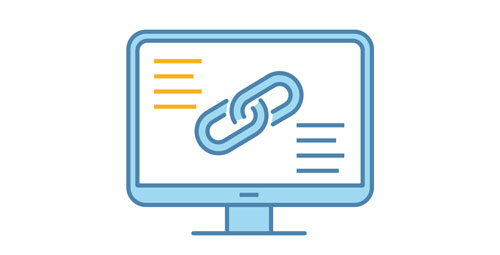Internal links allow users to navigate your site and find the content they want by taking them from one page to another within your website. Using the right internal linking strategy on your website can be a gamechanger in terms of boosting SEO and rank value.
Internal links are essential for connecting your content and giving Google the information it needs. In addition, the internal links on your website establish your link architecture and allow Google to rank your website URLs in order of importance. There are several reasons why internal links are essential.
3 Reasons Internal Links are Important

- They allow your users to navigate your website.
- They help create an information hierarchy for your website.
- They spread link equity or ranking power around the website.
Internal Links Help with Website Navigation
Let’s use the example of an ecommerce site that sells shoes. The home page of our website has a distinct URL or link – www.MyShoeStore.com (not an actual link, for example purposes only). From our home page, we have internal links to other pages on our website.
We have an About page, a Contact Us page, and other pages for Men’s Shoes, Women’s Shoes, and Kid’s Shoes. Each page link helps our users navigate our site, learn about our business, and find the pair of shoes they are searching for.
Internal Links Create Information Hierarchy
Our internal links also tell Google how important each page is on our website. For example, if we link between the home page, Women’s Shoes, and Men’s Shoes multiple times but only link to Kid’s Shoes from the home page, our linking tells Google that Kid’s Shoes are not that important. As a result, that page will rank lower.
Internal Links Spread Link Equity
If we link equal times between the Men’s Shoes, Women’s Shoes, and Kid’s Shoes, we can also add internal links from the blogs, product descriptions, and collection text on our website to each of these pages to continue increasing each page’s ranking. For example, in the product description for a woman’s shoe, we may link to another similar shoe as a suggested purchase, keeping the user on our website longer. Internal linking also helps the Google bot crawl our site and determine how one page gives link equity to another.
How Do Internal Links Impact SEO?

Search engines use links to crawl a site. If there are no internal links to guide them, they can’t travel the website and rank it. Without internal links, it takes Google much longer to find a page if it finds it at all.
The ranking of our page is much more than the use of internal linking. It is how the links are used, the anchor text they are attached to, and the context surrounding the link on the referring page. Google can get the link’s context through page title, H1 titles, and subheadings – the same places we strive to add our keywords for SEO.
Do Internal Links Affect Page Ranking?
Internal links are essential for SEO but do not add directly to our page ranking. Instead, these links add page authority by providing more opportunities for other websites to link to our website, which is how we build site authority. A link from another website to our website is a backlink, and high-quality backlinks are how we build our site authority. Internal links are how we spread that authority to the other pages on our website.
If thoughts of internal links, backlinks, and site authority keep you up at night, creating your website strategy is an ideal opportunity to partner with an SEO consultant. Your website can be a powerful tool for your business for years to come. Enlist the help of a professional to outline your company’s marketing strategy and set your business up for success.
